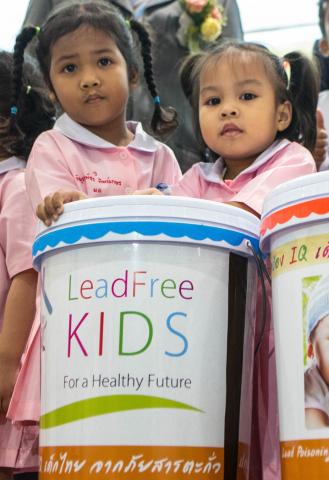Canadian company opposing EU efforts to eliminate lead paint

Representatives of European Union (EU) countries will this week examine an application by Canadian-based Dominion Colour Corporation to continue to use lead pigments despite a ban from the European Chemicals Agency. Dominion has spent over 1 million Euros over the past three years to be exempted from an EU ban on two lead pigments used in paints, which was originally scheduled to come into effect in May 2015. Dominion states that its lead pigments are supposed to be used for industrial purposes.
“Other paint companies including the largest ones in Europe have already stopped using lead in paint and support the ban,” said Tatiana Santos of the European Environmental Bureau, “We are outraged that a Canadian company is single-handedly fighting to continue the use of lead pigments in paint.”
Dominion is one of the largest manufacturers of lead pigments in the world and has factories in Canada, Europe and other countries. At a February 3 and 4, 2016 meeting of the EU REACH Committee, representatives of EU countries will discuss Dominion's application.
“The biggest paint company in the world, AkzoNobel, stopped using lead in any of its products, including industrial paints, since 2011,” said Perry Gottesfeld, Executive Director of Occupational Knowledge International. “We urge the EU REACH Committee to deny Dominion's claims and act to protect public health.”
The British Coatings Federation, Netherlands-based AkzoNobel, and Germany-based BASF have expressed their opposition to continued use of these lead paint ingredients and oppose Dominion’s attempt to defeat the ban.
Over 120 countries voted to eliminate the use of lead in all paints and launched a UN-sponsored program to get these chemicals out of paints by 2020. Dominion has refused requests from Canadian health and environmental groups to support this initiative and drop its opposition to the EU ban.
“Exposure to lead causes harm to workers, their families, communities and particularly children,” said Dr. Bruce Lanphear, professor in the Faculty of Health Sciences, Simon Fraser University. “Globally, 90% of lead poisoned children live in low-to-middle income countries. Lead causes low birth weight, learning problems, and behavioral problems, like ADHD in children. In adults, lead is a risk factor for hypertension, chronic kidney disease and accounts for 674,000 deaths each year around the world.”
“Lead pigments manufactured in Europe are exported overseas to countries where there are no safety controls,” said Kathleen Ruff, director RightOnCanada, a human rights website. ”Dominion says the lead pigments it exports are used only for specific applications. But Dominion has no way of controlling how these lead pigments are used in countries in Asia, Africa and South America where Dominion exports its lead pigments.”
"There is a strong global movement to eliminate lead paint by 2020 and authorization by the EU of the use of lead pigments - even if supposedly intended for certain applications - would send entirely the wrong message,” said Dr. Sara Brosché of IPEN. “Paints with high levels of lead are still common in countries with developing economies, and constitute a severe health hazard leading to high social and economic cost for the country.”
The World Health Organization (WHO) calls lead paint “a major flashpoint” for children’s potential lead poisoning and says that “since the phase-out of leaded petrol, lead paint is one of the largest sources of exposure to lead in children.” Children are exposed to lead when painted surfaces deteriorate over time and contaminate household dust and soils. Children ages 0-6, engaging in normal hand-to-mouth behaviors, are most at risk of damage to their intelligence and mental development from exposure to lead dust and soil.
FOR MORE INFORMATION:
Perry Gottesfeld, San Francisco, okperry@gmail.com
Dr. Bruce Lanphear, Vancouver, blanphear@sfu.ca
Tatiana Santos, Brussels, tatiana.santos@eeb.org
Kathleen Ruff, Smithers, BC, kruff@bulkley.net
Dr. Sara Brosché, IPEN, Gothenburg; sarabrosche@ipen.org
NOTES FOR EDITORS:
• The European Environmental Bureau is Europe’s largest federation of environmental organisations with over 140 member organisations, http://www.eeb.org
• Occupational Knowledge International has been working for many years to eliminate lead paint around the world, http://www.eeb.org
• RightOnCanada.ca promotes human rights and public health, www.rightoncanada.ca
• IPEN is an international NGO network comprised of organizations in 116 countries working to establish and implement safe chemicals policies and practices, http://www.ipen.org
Agenda of EU REACH Committee (Registration, Evaluation, Authorisation and Restriction of Chemicals), Feburary 3 & 4, 2016, ec.europa.eu/transparency/regcomitology/index.cfm?do=Search.getPDF&w564nMhKUMSKtZsL9U/JUVqBB7fI4EnisQ1BdEUO8vC5SVAw47eF02NzJJLXFBE72csWX
